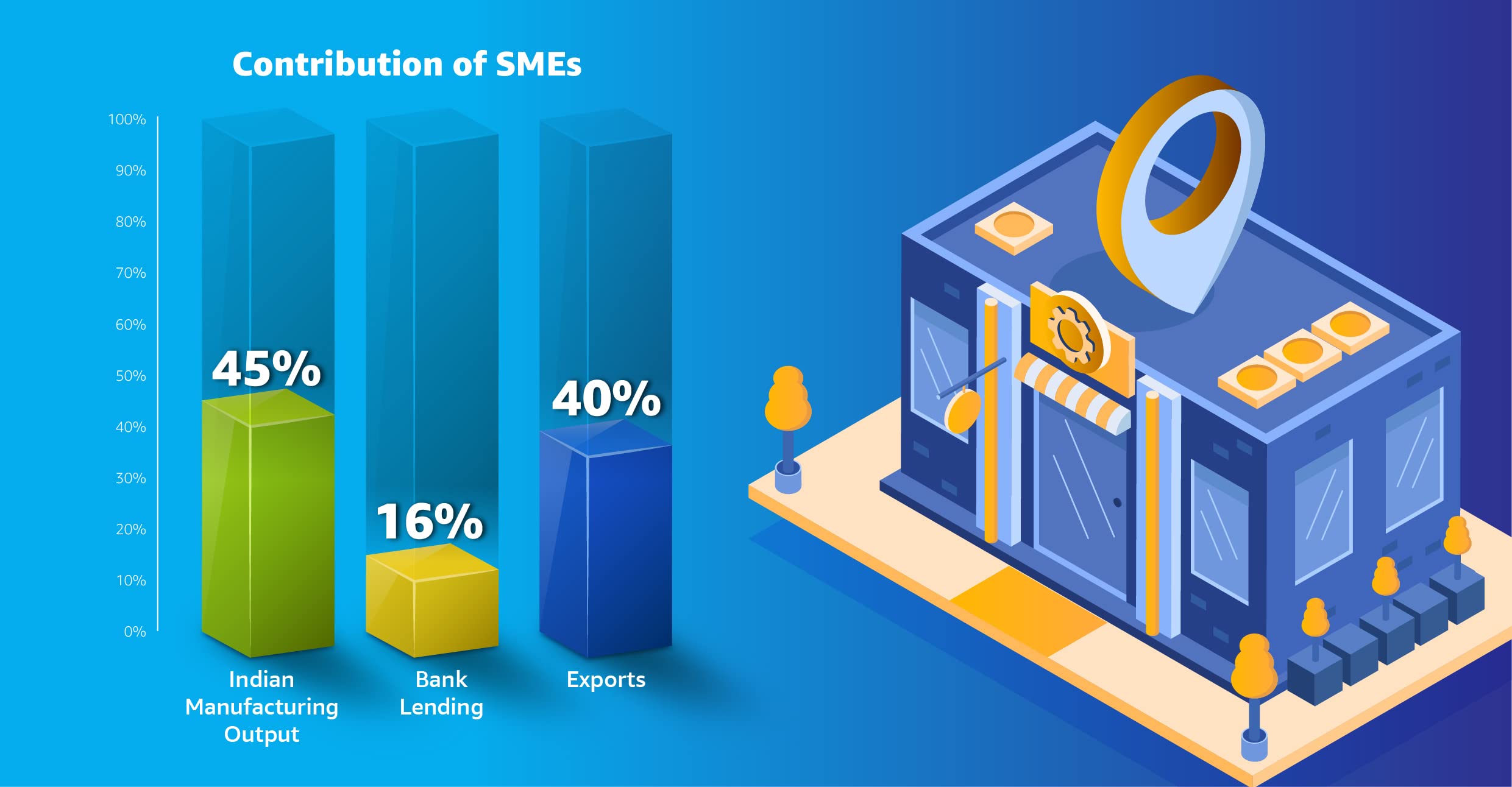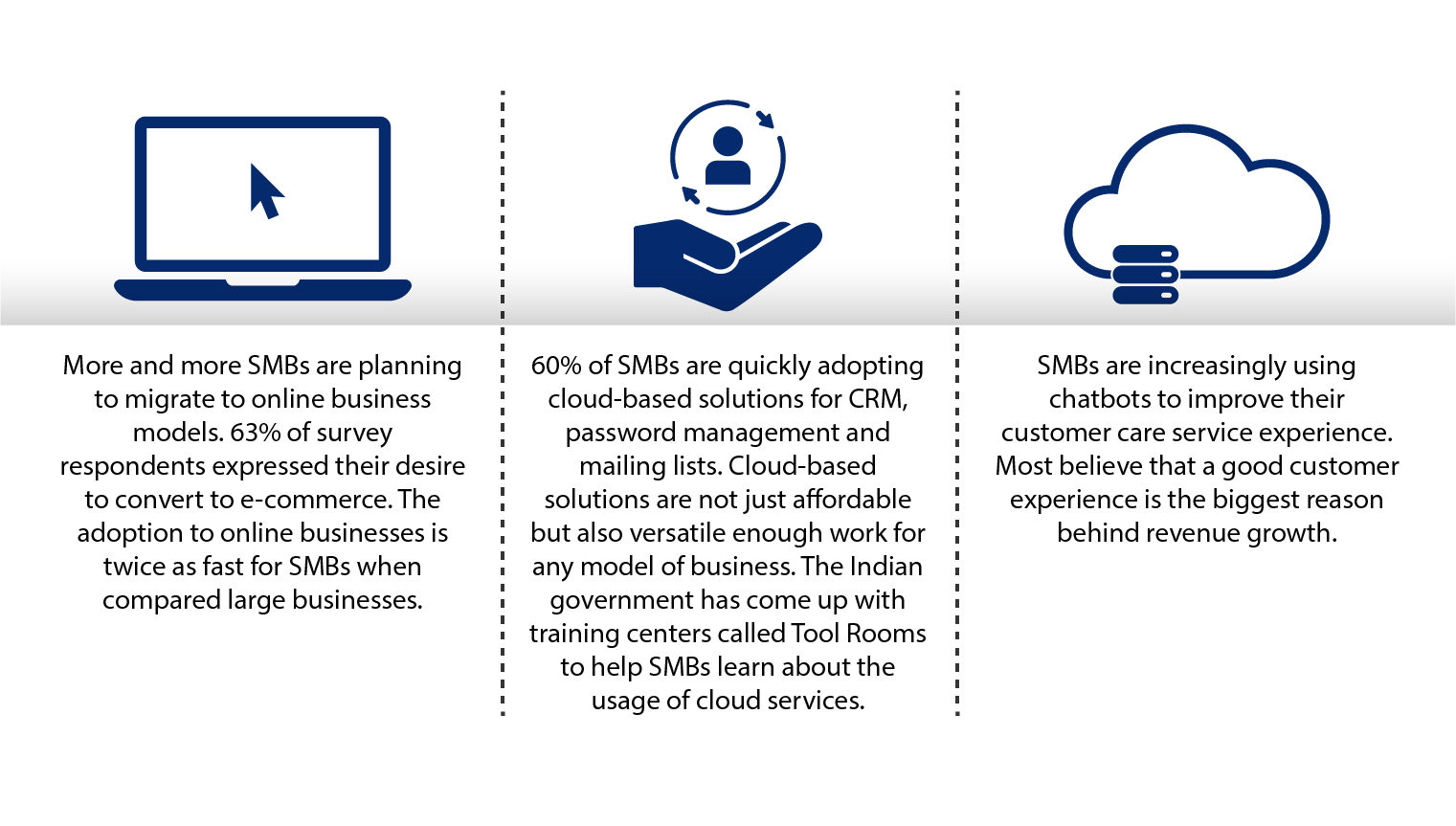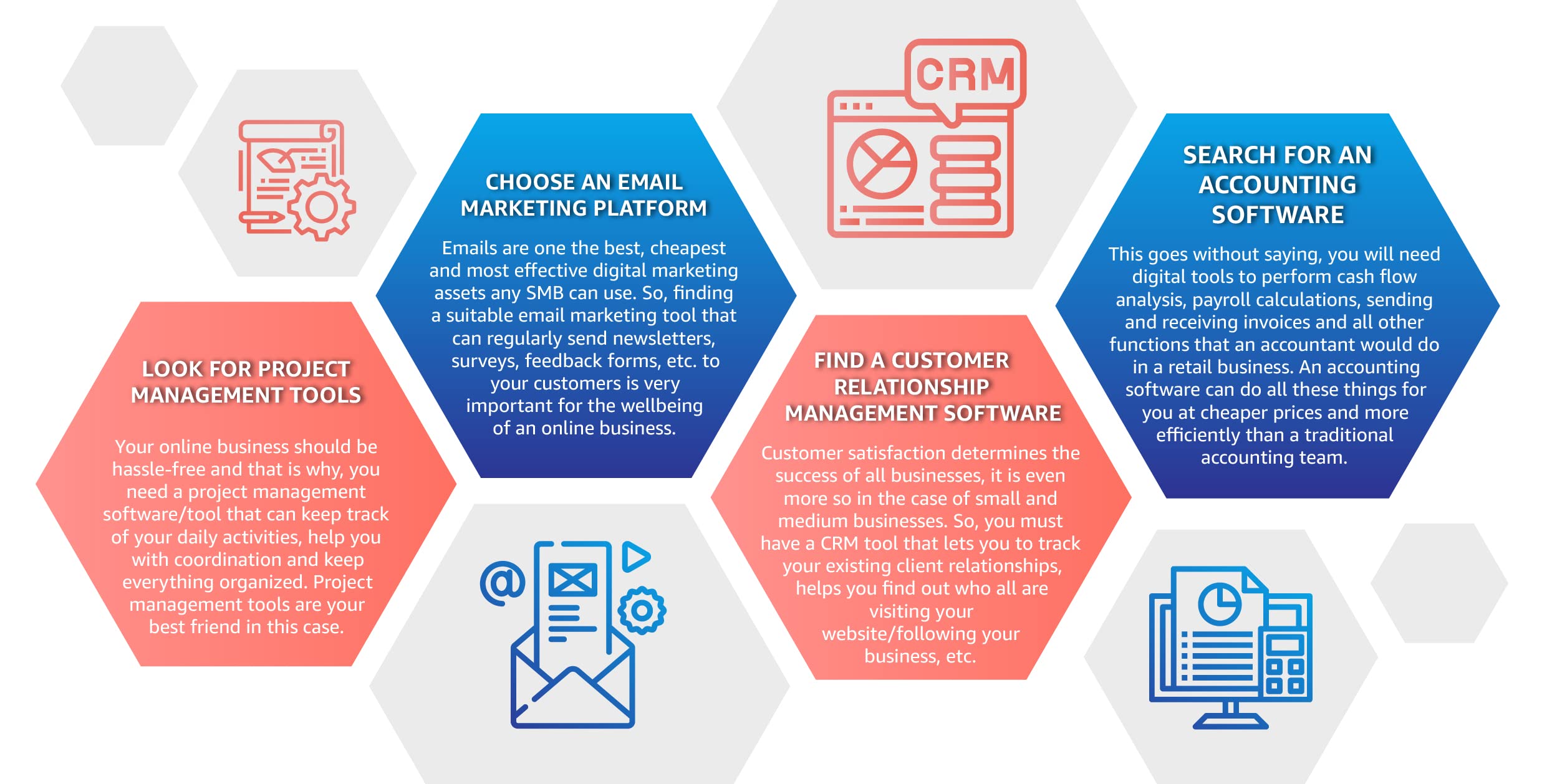
An overview of the MSME/SMB sector in India
In recent times, the Micro, Small, and Medium Enterprises (MSMEs)/Small and Medium Businesses (SMBs) have become an extremely important sector for the Indian economy. The sector has contributed 30% [1] to Gross Domestic Product (GDP) and the figure is estimated to reach 50% by 2025. SMBs also comprise 40% [2] of the total exports from India and have provided employment to roughly 110 million [3] people.

How is the sector faring in India’s digital economy?
India has one of the world’s largest digital economies supported by 500 million users [4]. The country is preparing itself to become a USD 1-trillion digital economy by 2025[5]. Are small and medium businesses capitalizing on the opportunities? Market data shows otherwise.
Even though India has a 63-million strong Micro, Small, and Medium Enterprises (MSME) sector, unfortunately only 32% [6] are digitally connected today. However, the e-commerce sector is estimated to reach USD 30 billion in value by 2030[7]. So, the scope for small and medium businesses (SMBs) to benefit from online business remains very high but largely unexplored.
That said the COVID-19 pandemic has changed the world, as we know it. Therefore, the need of the hour in the new normal is that SMBs must also focus on digital channels. The good news is, as the economy takes baby steps towards revival, India’s retail spending has recovered to 90% [8] from the pre-COVID level. This could be one of the best times to take your retail businesses online.
Even though India has a 63-million strong Micro, Small, and Medium Enterprises (MSME) sector, unfortunately only 32% [6] are digitally connected today. However, the e-commerce sector is estimated to reach USD 30 billion in value by 2030[7]. So, the scope for small and medium businesses (SMBs) to benefit from online business remains very high but largely unexplored.
That said the COVID-19 pandemic has changed the world, as we know it. Therefore, the need of the hour in the new normal is that SMBs must also focus on digital channels. The good news is, as the economy takes baby steps towards revival, India’s retail spending has recovered to 90% [8] from the pre-COVID level. This could be one of the best times to take your retail businesses online.
Why should SMBs consider going online?
Simply put, the benefits of shifting your retail business to a digital e-commerce platform or marketplace can be many. Here are some of them:
- Having an online presence can allow SMBs to get access to a nationwide customer base. The market outreach provided by e-commerce marketplaces can be far greater than physical retail businesses.
- E-commerce marketplaces can also allow SMBs to reach out to new and unexplored markets, resulting in quick new customer acquisition.
- An online presence can reduce the costs of marketing, improves revenue margins and general customer experience, adding to the goodwill of the business.
- It can let SMBs make the most of India’s fast-growing digital transaction space.

Online stores versus offline stores
There are many advantages of taking your small or medium business online. Now let’s look at how these advantages.
In order to have an online store, all you need is a suitable e-commerce marketplace and all the necessary tech support that it may require. Physical stores are expensive: rent, electricity bills, maintenance costs and staff salaries are only a few of the costs that you have to bear.
Having a website presence, no matter how big or small your business is, adds credibility. In this age of mobility and digital economy, a website is a proof of how well-adjusted you are to the current times. Online marketing activities done through your website can also be a lot cheaper than offline marketing.
In short, online stores may prove to be comparatively cheaper, low maintenance and cost-effective in the long run.
In order to have an online store, all you need is a suitable e-commerce marketplace and all the necessary tech support that it may require. Physical stores are expensive: rent, electricity bills, maintenance costs and staff salaries are only a few of the costs that you have to bear.
Having a website presence, no matter how big or small your business is, adds credibility. In this age of mobility and digital economy, a website is a proof of how well-adjusted you are to the current times. Online marketing activities done through your website can also be a lot cheaper than offline marketing.
In short, online stores may prove to be comparatively cheaper, low maintenance and cost-effective in the long run.
Here are some of the top market trends impacting online small and medium businesses:
Things have rapidly changed in recent times and it is a well-established fact that online businesses are in huge demand. What about the SMBs who have already taken their businesses online? A survey by Lendingkart [9] has revealed some interesting trends that will impact MSMEs/SMBs in the coming days. Let us take a quick look:
- More and more SMBs are planning to migrate to online business models. 63% of survey respondents expressed their desire to shift to e-commerce. SMBs have adopted online businesses twice as fast as large businesses.
- 60% of SMBs are quickly adopting cloud-based solutions for CRM, password management and mailing lists. Cloud-based solutions are not just affordable but also versatile enough to work for any model of business. The Indian government has come up with training centers called Tool Rooms to help SMBs learn about the usage of cloud services.
- SMBs are increasingly using chatbots to improve their customer care service experience. Most believe that a good customer experience is the biggest reason behind revenue growth.

What kind of digital tools and services do SMBs need for successfully transitioning to online business?
If you’re considering to shift your retail business online and give selling on e-commerce marketplaces a shot, there are few digital tools and technologies that can come in handy for your new online business:
- Look for Project Management Tools: Your online business should be hassle-free and that is why, you need a project management software/tool that can keep track of your daily activities, help you with coordination and keep everything organized. Project management tools are your best friend in this case.
- Choose an Email Marketing Platform: Emails are one the best, cheapest and most effective digital marketing assets any SMB can use. So, finding a suitable email marketing tool that can regularly send newsletters, surveys, feedback forms, etc. to your customers is very important for the prosperity of an online business.
- Find a Customer Relationship Management Software: Customer satisfaction determines the success of all businesses. So, you must have a CRM tool that lets you track your overall website traction and existing client interactions across social channels.
- Search for an Accounting Software: This goes without saying, you will need digital tools to perform cash flow analysis, payroll calculations, sending and receiving invoices and all other functions that an accountant would do in a retail business. An accounting software can do all these things for you more efficiently than a traditional accounting team.

Conclusion
India’s e-commerce sector is poised to rake in $100-120 billion [10] in gross merchandise value (GMV) by 2025.Online businesses can prove to be a blessing in disguise, given the devastation caused by the COVID-19 pandemic. The time is ripe for small and medium businesses to make the transition to e-commerce. So, if you too are looking forward to taking the online business route, go ahead and register your seller business on Amazon today.
Disclaimer: Whilst Amazon Seller Services Private Limited ("Amazon") has used reasonable endeavours in compiling the information provided, Amazon provides no assurance as to its accuracy, completeness or usefulness or that such information is error-free. In certain cases, the blog is provided by a third-party seller and is made available on an "as-is" basis. Amazon hereby disclaims any and all liability and assumes no responsibility whatsoever for consequences resulting from use of such information. Information provided may be changed or updated at any time, without any prior notice. You agree to use the information, at your own risk and expressly waive any and all claims, rights of action and/or remedies (under law or otherwise) that you may have against Amazon arising out of or in connection with the use of such information. Any copying, redistribution or republication of the information, or any portion thereof, without prior written consent of Amazon is strictly prohibited.
Market Data & Statistics
Signup for our newsletter and get notified when we publish new articles for free directly into your inbox.
Browse Bizzopedia by Category
Get the latest updates on all things business
Share you information to subscribe and get updates on business guides, trends, tips
Share the knowledge of Bizzopedia
Article Categories
Amazon Programs for SMBs
© 2024 Amazon.in, Inc. or its affiliates. All rights reserved.





